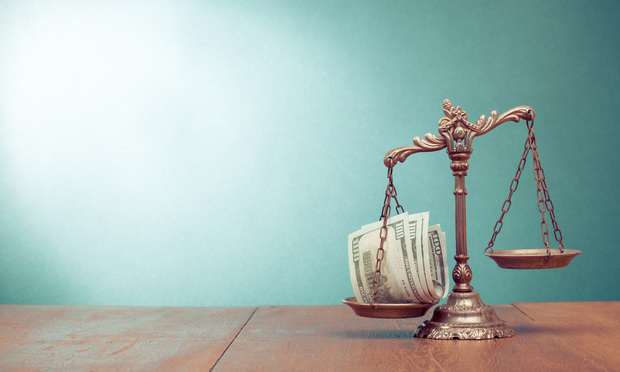Don't Let Your Business Get Gouged by COVID-19 Price Change Class Actions
As the pandemic continues, companies should pay attention to how the shifting dynamics of the price gouging legal regime may impact their pricing decisions.
June 08, 2020 at 05:58 PM
6 minute read

Amid the COVID-19 pandemic, news feeds have been replete with stories of some businesses and individuals taking advantage of the situation and inflating prices for critical items in violation of federal and state laws. Many other businesses, however, face a Catch-22. Unprecedented supply chain changes and pricing pressures necessitate some price increases, but state and local laws are announced daily that severely limit the ability to increase prices. Navigating these dynamic legal requirements of new and evolving price gouging laws presents a host of issues for companies seeking to manage their businesses and continue compliance.
Laws That Could Give Rise to Class Action Exposure
Price gouging laws generally share a few common elements: they are triggered by certain types of "public emergencies"; they apply to certain types of goods or services; and they are intended to police the unconscionable or excessive pricing of those goods or services during the public emergency. Not all state price gouging laws provide private litigants a right to sue. While some state laws do, and may even expressly allow for class actions, such as in Michigan, other states make price gouging a violation of another state consumer protection law. This allows for dual enforcement—by the government and by private litigants. For example, there are three putative consumer class actions pending in California federal courts alleging illegal price gouging conduct surrounding the prices of foods, medical supplies and consumer goods. Instead of suing under California's price gouging statute, the plaintiffs in these cases brought claims under the state's unfair competition statute. This was possible because the price gouging statute expressly states that a violation under the statute also constitutes unfair competition under another statute that has historically been used as a vehicle for class action claims. The plaintiffs in the California cases also brought claims alleging illicit price gouging conduct under other legal theories commonly forwarded in class actions—breach of contract, negligence and unjust enrichment.
In the wake of the COVID-19 pandemic, federal and state governments also are bringing investigations and reviewing the efficiency and efficacy of consumer protection and price gouging statutes. In addition to investigations in 46 states, including New York, California and Connecticut, this scrutiny has created a moving target for companies when it comes to assessing possible price gouging conduct, and it is important that companies keep track of this shifting legal regime. Already, some states have passed or are considering new or expanded price gouging laws. For example, pre-COVID-19, Alaska and Maryland had no codified anti-price gouging statute. That changed during the pandemic; now 38 states have some sort of anti-price gouging law. Some states, such as New York, have passed bills expanding their anti-price gouging statutes to explicitly cover broader categories of goods, such as medical supplies. Other states, such as California and New Jersey, limit how much the price of certain goods may increase from "pre-emergency" to a declared state of emergency. These states have anti-price gouging statutes with defined ceilings of between 10% (e.g., California) and 25% (e.g., Kansas). In contrast, such states as New York and Florida, generally prohibit "unconscionable" increases above pre-emergency prices.
At the federal level, the House of Representatives passed the HEROES Act, which, if codified, will create the first-ever federal anti-price gouging statute. A violation of the proposed federal statute will automatically constitute a violation under the Federal Trade Commission Act, the operating statute that empowers the Federal Trade Commission to prevent and police unfair methods of competition. While the HEROES Act does not allow a private litigant to bring claims, scrutiny from federal regulators will only attract attention to a company's pricing practices and lend support to consumer class action lawsuits predicated on the same practices. As of June 8, the bill is still being considered by the U.S. Senate.
Prudent Responses to the Price Gouging Legal Regime
Class action exposure for price gouging can be significant, ranging from injunctive relief, damages, restitution, penalties or attorney fees. For example, North Carolina and New Jersey's consumer protection and consumer fraud laws allow recovery of treble damages and attorney fees.
Price gouging laws do not mean, however, that a business can never change its price during public emergencies. While there are no set rules for making pricing decisions across all industries and in compliance with all state and local legislation, it is clear that companies need to closely evaluate and methodically plan pricing decisions with input from legal counsel at the outset.
First, companies can consider maintaining an understanding of state and federal laws addressing price gouging conduct. While the shifting legal regimes make this easier said than done, it is prudent to do so.
Second, some price gouging statutes consider whether price increases reasonably reflect actual additional costs that arise from the emergency circumstances. Thus, if price increases are considered, companies may want to document the rationale for the proposed increases. These rationales include, for example, increased input, manufacturing, labor or transportation costs. Companies may also want to document any projected impact of a public emergency on their businesses. Such records would be most useful if kept in a contemporaneous manner to justify a challenged price increase.
Third, companies looking to avoid price gouging liability should also consider being cognizant of state and federal antitrust laws and ensure their decisions with respect to pricing do not violate them. Even in a declared state of public emergency, it is illegal to coordinate output or pricing with competitors.
As the COVID-19 pandemic continues, companies can continue to operate their businesses in a manner that allows them to flexibly respond to evolving conditions. However, they should stay vigilant and continue to monitor how the shifting dynamics of the price gouging and consumer protection legal regimes may impact their pricing decisions and practices.
Carrie Mahan is a partner in Washington, D.C., Eric Hochstadt is a partner in New York, Pravin Patel is counsel in Miami and Anthony Duh is an associate in New York. All are members of the global litigation department at Weil, Gotshal & Manges.
This content has been archived. It is available through our partners, LexisNexis® and Bloomberg Law.
To view this content, please continue to their sites.
Not a Lexis Subscriber?
Subscribe Now
Not a Bloomberg Law Subscriber?
Subscribe Now
NOT FOR REPRINT
© 2025 ALM Global, LLC, All Rights Reserved. Request academic re-use from www.copyright.com. All other uses, submit a request to [email protected]. For more information visit Asset & Logo Licensing.
You Might Like
View All
Switching Positions: US Solicitors General and Climate Change Lawsuits
6 minute read
Jimmy Carter’s 1974 Law Day Speech: A Call for Lawyers to Do the Public Good
14 minute readLaw Firms Mentioned
Trending Stories
- 111th Circuit Rejects Trump's Emergency Request as DOJ Prepares to Release Special Counsel's Final Report
- 2Supreme Court Takes Up Challenge to ACA Task Force
- 3'Tragedy of Unspeakable Proportions:' Could Edison, DWP, Face Lawsuits Over LA Wildfires?
- 4Meta Pulls Plug on DEI Programs
- 5On the Move and After Hours: Meyner and Landis; Cooper Levenson; Ogletree Deakins; Saiber
Who Got The Work
Michael G. Bongiorno, Andrew Scott Dulberg and Elizabeth E. Driscoll from Wilmer Cutler Pickering Hale and Dorr have stepped in to represent Symbotic Inc., an A.I.-enabled technology platform that focuses on increasing supply chain efficiency, and other defendants in a pending shareholder derivative lawsuit. The case, filed Oct. 2 in Massachusetts District Court by the Brown Law Firm on behalf of Stephen Austen, accuses certain officers and directors of misleading investors in regard to Symbotic's potential for margin growth by failing to disclose that the company was not equipped to timely deploy its systems or manage expenses through project delays. The case, assigned to U.S. District Judge Nathaniel M. Gorton, is 1:24-cv-12522, Austen v. Cohen et al.
Who Got The Work
Edmund Polubinski and Marie Killmond of Davis Polk & Wardwell have entered appearances for data platform software development company MongoDB and other defendants in a pending shareholder derivative lawsuit. The action, filed Oct. 7 in New York Southern District Court by the Brown Law Firm, accuses the company's directors and/or officers of falsely expressing confidence in the company’s restructuring of its sales incentive plan and downplaying the severity of decreases in its upfront commitments. The case is 1:24-cv-07594, Roy v. Ittycheria et al.
Who Got The Work
Amy O. Bruchs and Kurt F. Ellison of Michael Best & Friedrich have entered appearances for Epic Systems Corp. in a pending employment discrimination lawsuit. The suit was filed Sept. 7 in Wisconsin Western District Court by Levine Eisberner LLC and Siri & Glimstad on behalf of a project manager who claims that he was wrongfully terminated after applying for a religious exemption to the defendant's COVID-19 vaccine mandate. The case, assigned to U.S. Magistrate Judge Anita Marie Boor, is 3:24-cv-00630, Secker, Nathan v. Epic Systems Corporation.
Who Got The Work
David X. Sullivan, Thomas J. Finn and Gregory A. Hall from McCarter & English have entered appearances for Sunrun Installation Services in a pending civil rights lawsuit. The complaint was filed Sept. 4 in Connecticut District Court by attorney Robert M. Berke on behalf of former employee George Edward Steins, who was arrested and charged with employing an unregistered home improvement salesperson. The complaint alleges that had Sunrun informed the Connecticut Department of Consumer Protection that the plaintiff's employment had ended in 2017 and that he no longer held Sunrun's home improvement contractor license, he would not have been hit with charges, which were dismissed in May 2024. The case, assigned to U.S. District Judge Jeffrey A. Meyer, is 3:24-cv-01423, Steins v. Sunrun, Inc. et al.
Who Got The Work
Greenberg Traurig shareholder Joshua L. Raskin has entered an appearance for boohoo.com UK Ltd. in a pending patent infringement lawsuit. The suit, filed Sept. 3 in Texas Eastern District Court by Rozier Hardt McDonough on behalf of Alto Dynamics, asserts five patents related to an online shopping platform. The case, assigned to U.S. District Judge Rodney Gilstrap, is 2:24-cv-00719, Alto Dynamics, LLC v. boohoo.com UK Limited.
Featured Firms
Law Offices of Gary Martin Hays & Associates, P.C.
(470) 294-1674
Law Offices of Mark E. Salomone
(857) 444-6468
Smith & Hassler
(713) 739-1250












